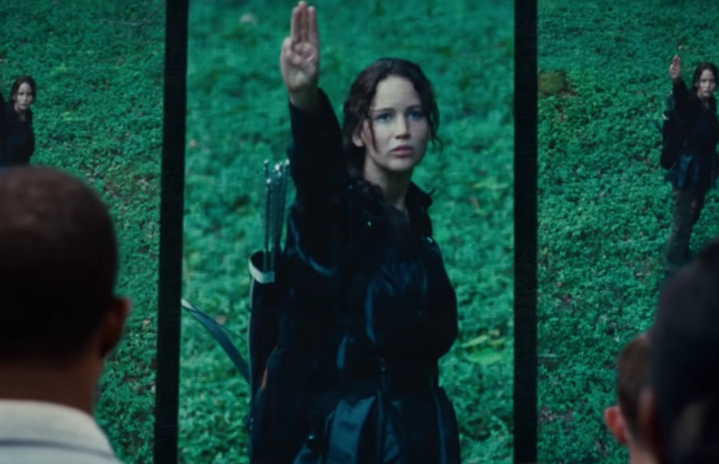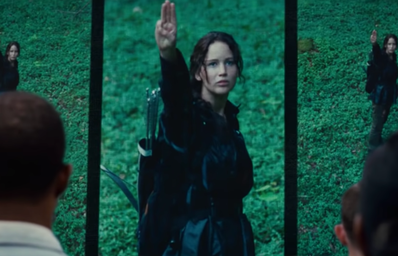**Spoilers for The Hunger Games: The Ballad of Songbirds and Snakes ahead**
The highly anticipated prequel to the Hunger Games Trilogy, The Ballad of Songbirds and Snakes premiered on Thursday, November 16th. As someone who has read the original novels and seen the original movies multiple times, I was very excited to see the film. The original trilogy took the world by storm and I wondered if this prequel would stir up the same excitement.
The Hunger Games: The Ballad of Songbirds and Snakes was able to execute the origin story of the villain we meet in the original films, President Coriolanus Snow. However, the chaotic and jumpy rhythm of the movie left much to be desired in this viewer’s opinion. Unfortunately, feature films are rarely able to capture the details and nuances of the novels they are based on. In the case of this Hunger Games prequel, which has a page count of 528, making it author Suzanne Collins’ longest Hunger Games book ever, the film was not able to capture the full scope of what Panem and its inhabitants were like during the 10th Hunger Games.
The rich intricacies of the early days of post-rebellion Panem explored in the novel do not make it to the screen. However, Tom Blyth’s portrayal of young Coriolanus Snow from a traumatized little boy scarred by war and starvation to a sinister young man who will do anything to survive should be applauded. President Snow’s villain origin story is excellent, as it does not seek to make us sympathize with young Snow, so that we may understand his motives and evil in the original films. Coriolanus Snow is no victim, and the movie shows that despite experiencing hardships like starvation and violence, the same things faced by the districts, he does not care. Shared experiences and empathy do not move him. As the snake he is, he sneaks about, manipulating, lying and cheating no matter the consequence to those around him. He does anything to survive.
The songbird in the story, Lucy Gray Baird, is played by Rachel Zegler, who rose to popularity after starring as Maria in Steven Spielberg’s West Side Story in 2021. Zegler does an excellent job at bringing Lucy Gray to life, illuminating her flamboyant and charming personality. Lucy Gray is a performer and uses that to her advantage in the Games, with her singing voice as one of her biggest tools. Zegler has an amazing singing voice and sang every song live. She brings power to the ballads Lucy Gray sings to capture the attention of the Capitol and emotion to the folk songs of District 12.
Zegler succeeded in balancing references to Katniss, but also playing Lucy Gray as her own. Lucy Gray and Katniss Everdeen are very different people, two sides of the same coin. It would be tempting for an actress to try and emulate Jennifer Lawrence’s performance, but Zegler was able to show that Lucy Gray and Katniss are not the same person. One of the best parts of Zegler’s performance are her facial expressions. In the original films Katniss holds her emotions in, but in contrast Lucy Gray shows what she is feeling and Zegler does an excellent job at acting this characteristic. Both Zegler and Blyth embody the symbols their characters represent– a songbird and a snake.
The biggest let down of the film was the lack of buildup to Snow’s betrayal of Lucy Gray. In the novel, we know that Snow will turn on Lucy and all others that loved him, but that sense of tension is ultimately lacking in the film. Despite us knowing President Snow’s fate, it is still incredibly jarring to witness the disintegration of his and Lucy’s relationship in the novel, especially when Snow relinquishes a storm of gunfire on Lucy Gray as she attempts to escape him. The film failed to bring the same shock level that the novel offered. Additionally, the love story between Lucy Gray and Snow is dampened in the film. Zegler and Blyth have chemistry, but many of the moments in the novel that develop their relationship were not in the film. This again makes Snow’s betrayal less impactful. If the film had allotted more time to the development of their relationship after Lucy Gray has won and Snow is a peacekeeper in District 12 then his attack on her would have been far more heartbreaking to witness. The novel is able to lull readers into a sense of security that the film does not.
On a positive note, one of my favorite aspects of the film was its utilization of the original film’s score. The original music being brought back to life did an excellent job at exploring the parallels between the original films. One integral aspect of the novel and film is for the audience to see why Katniss is so hated by President Snow. By using the same musical themes that fans associate so deeply with Katniss, it makes the references to her in the film more powerful.
Overall, The Ballad of Songbirds and Snakes is an average prequel, but it could have been so much more. I was hoping to feel fully immersed into a new chapter of the The Hunger Games world, but ultimately it only made me want to watch the original films. The individual performances of Zegler and Blyth were great, but the screenplay was lackluster. I am curious to see if a second watch would improve my impression of the film, but based on the first watch I do not see this prequel stirring the same fervor as the original films.


